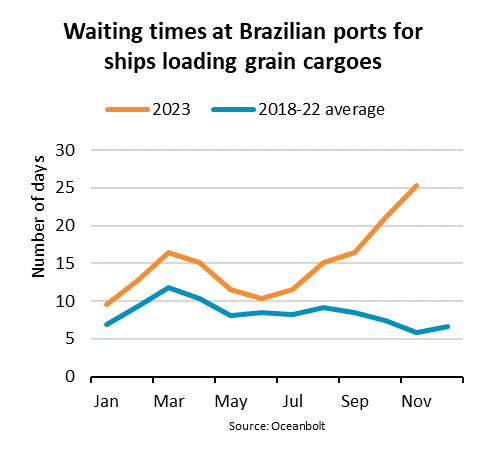BIMCO Shipping Number of the Week: New solutions needed as waiting times at Brazilian ports reach 15 days
Brazil is the world’s largest grain exporter, accounting for 24% of the world’s exports in 2022. Exports rise after the start of the soybean harvest in March and during the maize harvest in the summer. Congestion is typically highest during periods of high export volumes.
According to Brazil’s association for grain exporters, ANEC, congestion was particularly high this year due large grain harvests. During the harvest months, the available storage was insufficient which pushed farmers to quickly increase exports, overloading the ports. Congestion worsened from September when low water levels in the Amazon disrupted shipping in the north. In the coming years, congestion could remain an issue since Brazil’s grain exports are expected to remain strong.
“The high congestion in Brazil highlights the need to better manage ship arrivals. If virtual arrival or just-in-time systems were adopted, waiting times could fall and large savings in bunker costs and in carbon emissions could be achieved,” says Gouveia.
Currently, ships are only allowed to join a queue to dock upon arrival, forcing them to sail at regular speeds despite the congestion ahead. If ships were permitted to enter the queue prior to arrival, they could opt for slower sailing speeds, thereby saving significant amounts of fuel and reducing their carbon emissions.
Virtual arrival is a solution for ships arriving in ports with known delays. It allows ships to adjust their speed during a voyage to arrive just in time at the port. The ship “virtually arrives” at the time scheduled had it continued at the original speed, and demurrage or other detention charges are adjusted accordingly. Just in time involves precise scheduling and coordination to ensure that a ship arrives at the port exactly when it's needed. For more information about inefficiency in shipping in general: The wrong speed for all the wrong reasons - download the white paper (bimco.org)
“Although Brazil’s case is extreme, it highlights an issue that prevails around the world. The practice of ships sailing at normal speed, emitting unnecessary carbon, only to wait in congestion is inherently wasteful. Ports, in cooperation with others in the supply chain, must continue to implement new queuing solutions to help the shipping industry decarbonize,” says Gouveia.

